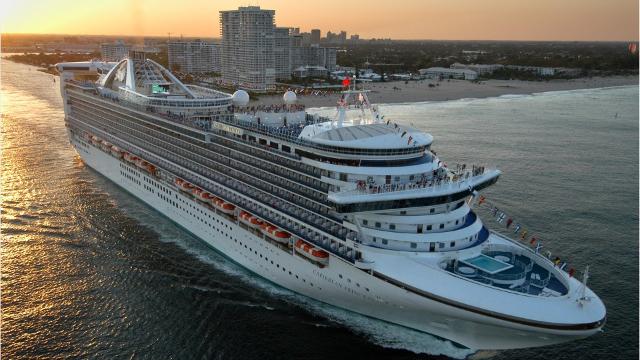Table Of Content

It is reasonable to ask whether several of these sexual assault victims were children. CLIA argued that cruise ship crime rates should be based on the total number of people cruising in any year (around 31,500,000 cruised last year) rather than the average number of people populating cruise ships on any given day. By analogy, the per capita crime statistics for U.S. cities are calculated based on the number of residents in a city. Tourists who visit the city during the year are not counted as residents. The purpose of the public disclosure of mandatory reporting of sexual assaults, assaults with serious bodily injuries, missing U.S. nationals and deaths on cruise ships is to educate and warn the traveling public of dangers on cruise ships.
Many Reported Crimes Have Jumped in Number
Carnival Cruise Line's per capita sexual assault rate is higher than most U.S. states - Boing Boing
Carnival Cruise Line's per capita sexual assault rate is higher than most U.S. states.
Posted: Sat, 20 Jan 2024 08:00:00 GMT [source]
There’s little doubt that these kinds of thoughts are scary, but thankfully the instances are also rare. If you’ve never taken a cruise before, you would be forgiven for wondering if it is a safe way to vacation. After all, if you only follow the industry casually, cruising might catch your attention when news stories covering negative events (passenger fights, illnesses aboard, or even passengers going missing) make the headlines.
Bottom Line: Are Cruises Safe?
Additionally, the definition of sexual assault under CVSSA is very restrictive and includes only a relatively small portion of the acts which would be deemed to constitute a sexual assault ashore. There has also been widespread criticism that the cruise lines often under-report the crimes which occur on their ships. Many victims, of course, are hesitant to report a violent crime like rape, particularly on a cruise ship which has no independent law enforcement officials aboard.
Cruise Line Incident Reports
When looking at the entire year, you can get a bigger picture of the trends in crimes reported aboard cruise lines. Under admiralty and maritime law, the laws of the country whose flag the ship flies are generally applicable. If a crime occurs in another country’s territorial waters, that country may also have jurisdiction. The security on cruise ships will help keep guests safe, and make sure that anyone breaking the rules (or the law) is dealt with quickly and efficiently. Cruise ships, however, are not based inside national borders and do not fit neatly under the effective jurisdiction of any one country. This means that there isn’t an obvious police force with ongoing responsibility for law and order on each cruise vessel.
Asked why three quarters of data appear to be missing from the website and when it would be updated, a DOT spokesperson said "the FBI compiles the data on cruise line incident reports that we publish on DOT's website." The CVSSA requires the data to be updated at least once a quarter, identify the cruise line involved, and specify if the alleged crime was committed by a cruise passenger or employee. Instead, the first three quarters of reports for the year weren’t public until the start of 2024, followed shortly later with the fourth quarter’s statistics just days ago.
Cruises
Wherever large groups of humans gather, the odds are very high that criminal activity will transpire. The situation can be more complicated due to the isolated environment and international waters adding layers of complexity to jurisdiction and law enforcement issues. Cruise line crime statistics first became public after Congress passed the 2010 Cruise Vessel Security and Safety Act (CVSSA) into law.

If there were to be an incident, cruise ships — especially in the Caribbean — stick to common routes and destinations. That means even though you might not realize it, there are other ships usually relatively close by that could render aid if needed. For example, Mexico has seen sordid headlines, including shooting on beaches, kidnappings, and drug-related violence. The U.S. State Department has a Level 2 warning on travel to The Bahamas, stating that “the majority of crime occurs on New Providence (Nassau) and Grand Bahama (Freeport) islands,” which are both popular cruise destinations.
If the ship is in port when a crime occurs, local authorities have clear jurisdiction. Each country is also entitled to jurisdiction in waters within 12 nautical miles of their shores, according to the United Nations Convention on the Law of the Sea. While cruise lines don't advertise their onboard policies or facilities for housing criminals, rest assured that every ship has a plan in place. It may involve house arrest in the offender's cabin with posted guards or actual incarceration in a specific cell.
Who Commits Crimes on Cruise Ships?
In fact, ports on your cruise can range from islands operated by the cruise line and for the enjoyment only of passengers to those that are completely independent of the cruise line. The new legislation is supported by International Cruise Victims, an organization of family members and victims affected by cruise ship crime. For those concerned about crime on cruise ships, there is some good news on the horizon. Furthermore, it’s not surprising that Carnival and Royal Caribbean see more incidents given that they also carry more passengers than any other cruise line.
Larger ships are likely to have a padded or otherwise safe lockup room called a "brig." Cruise lines are required to file a report on gastro illness before arriving in port — even if there are zero cases. The health agency posts outbreaks to their website when ships under their jurisdiction have 3% or more of passengers or crew reporting symptoms. However, crime against tourists (specifically cruise passengers), seems rare. In general, passengers tend to stay in safer tourist areas, and they are almost always visiting only during daylight hours. Plus, port areas have a strong interest in keeping tourists safe as they provide vital income to port areas.
Over the cruise industry’s objections, the CVSSA required cruise lines to report, for the first time, crimes that occur on cruise ships. In the Congressional hearings leading up to the new law, cruise industry representatives from the Cruise Line International Association (CLIA) tried to completely avoid reporting shipboard crimes. The Washington Post published an article yesterday which accurately reports that sexual assaults on cruise ships are increasing. The number of sexual assaults and rapes calculated on a per capita basis is significant and illustrated the importance of the mandatory reporting of these alleged crimes. The per capita sexual assault rate of over 42 per 100,000 on Carnival ships may actually be higher than this. These calculations assume that Carnival cruise ships are sailing at maximum capacity.
Many cruise lines increased the number of medical professionals on their ships following the onset of COVID-19. The data also listed 16 assaults involving severe bodily injury and 14 thefts of over $10,000. While the number of alleged sex crimes increased, it is less than 1% of the millions of cruise guests who board ships each year.

No comments:
Post a Comment